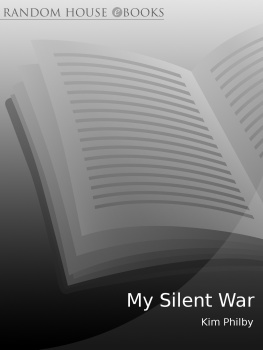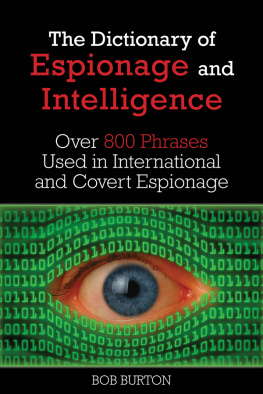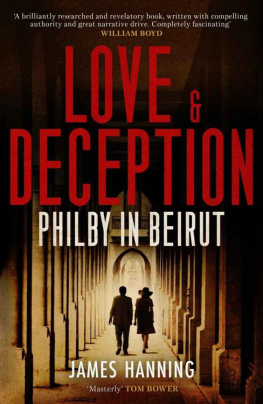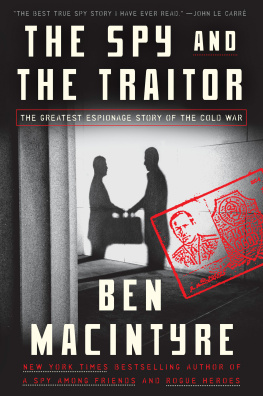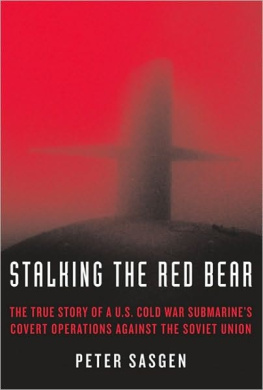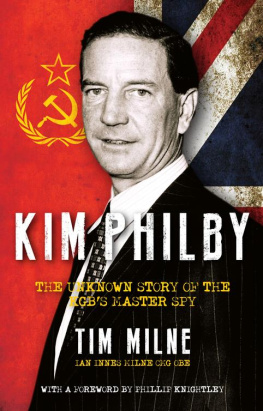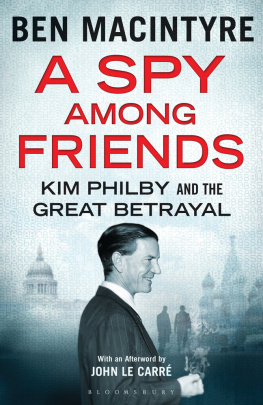This eBook is copyright material and must not be copied, reproduced, transferred, distributed, leased, licensed or publicly performed or used in any way except as specifically permitted in writing by the publishers, as allowed under the terms and conditions under which it was purchased or as strictly permitted by applicable copyright law. Any unauthorised distribution or use of this text may be a direct infringement of the authors and publishers rights and those responsible may be liable in law accordingly.
Epub ISBN: 9781407060231
Version 1.0
www.randomhouse.co.uk
Published by Arrow Books in 2003
1 3 5 7 9 10 8 6 4 2
Copyright 1968 by H. A. R. Philby
Introduction copyright 2002 by Phillip Knightley
H. A. R. Philby has asserted his right under the Copyright, Designs and
Patents Act, 1988, to be identified as the author of this work
This book is sold subject to the condition that it shall not, by way of trade or
otherwise, be lent, resold, hired out, or otherwise circulated without the
publishers prior consent in any form of binding or cover other than that in
which it is published and without a similar condition including this condition
being imposed on the subsequent purchaser
First published in the United Kingdom in 1968 by MacGibbon & Kee Ltd.
This edition published by arrangement with The Estate of Kim Philby.
Grateful acknowledgement is made to David Higham Associates for
permission to reprint the foreword by Graham Greene to My Silent War by
Kim Philby (Granada Publishing Ltd., London). Reprinted by permission.
Arrow Books
The Random House Group Limited
20 Vauxhall Bridge Road, London, SW1V 2SA
Random House Australia (Pty) Limited
20 Alfred Street, Milsons Point, Sydney,
New South Wales 2061, Australia
Random House New Zealand Limited
18 Poland Road, Glenfield
Auckland 10, New Zealand
Random House South Africa (Pty) Limited
Endulini, 5a Jubilee Road, Parktown 2193, South Africa
The Random House Group Limited Reg. No. 954009
www.randomhouse.co.uk
A CIP catalogue record for this book
is available from the British Library
Papers used by Random House are natural, recyclable products made from
wood grown in sustainable forests. The manufacturing processes conform to
the environmental regulations of the country of origin
ISBN 0 09 946236 2
Printed and bound in Great Britain by
Bookmarque Ltd, Croydon, Surrey
Table of Contents
Many people in the secret world aged the night they heard Philby had confessed.... It is one thing to suspect the truth; it is another to hear it from a mans lips. Suddenly there was very little fun in the game anymore; a Rubicon had been crossed.... To find that a man like Philby, a man you might like, or drink with, or admire, had betrayed everything; to think of the agents and operations wasted: youth and innocence passed away, and the dark ages began.
P ETER W RIGHT , former assistant director of MI5
Kim Philby is a legenda demon or an antihero, depending on ones philosophical bent. Philby himself, or a thinly disguised fictional counterpart, stalks through many modern spy novels.
R OBERT J. L AMPHERE , FBI special agent
[Philby] never revealed his true self. Neither the British, nor the women he lived with, nor ourselves ever managed to pierce the armour of mystery that clad him. His great achievement in espionage was his lifes work, and it fully occupied him until the day he died. But in the end I suspect that Philby made a mockery of everyone, particularly ourselves.
Y URI M ODIN , KGB controller of the Cambridge Spies
Philby has no home, no women, no faith. Behind the inbred upper-class arrogance, the taste for adventure, lies the self-hate of a vain misfit for whom nothing will ever be worthy of his loyalty. In the last instance, Philby is driven by the incurable drug of deceit itself.
J OHN LE C ARR
C ONTENTS
MY SILENT WAR
I NTRODUCTION
Phillip Knightley
Harold Adrian Russell PhilbyKim to his friends and familyhas been part of my life for the past thirty years. I have written hundreds of thousands of words about Philby, appeared in many television and radio documentaries discussing him, and once spent a whole week talking to him in Moscow for six or seven hours a day. I have read every word of the more than twenty books written about him. I know his children and grandchildren and I keep in touch with his widow. Yet when people ask me, What was Philby really like?, I have to reply, Im not certain I know.
So before you embark on the journey of reading this, the only book Philby ever wrote about himself, before you decide whether it is a frank confession, a fascinating justification for his life, or an insidious piece of Communist propagandaor possibly all threelet me tell you what I know about a man whose motives and exploits continue to intrigue a new generation fifteen years after his death.
We should begin by giving Philby his professional due. In the history of espionage there has never been a spy like him, and now, with the Cold War over, there never will be. His achievements seem incredible. He joined the British Secret Intelligence Service (MI6) in 1940 and in three years rose to be head of its anti-Soviet section. Yet right from his Cambridge University days this urbane, pipe-smoking paragon of the English middle class had been an agent of the KGB. So the man running British operations against the Russians was actually working for the Russians himself. No wonder so few British plans worked. No wonder so many Western agents who slipped behind the Iron Curtain were never heard of again.
Worse was to come. In 1949 Philby was promoted to be the British Secret Services liaison officer in Washington with the CIA and the FBI. This gave him access not only to British operations against Moscow but to American ones as well. The result: at the height of the Cold War, every move the West made against the Communist bloc was betrayed by Philby before it even began. And there was every possibility that had it not been for one mistake, Philby would have gone on to become CSS, Chief of the British Secret Service. The KGB would, in effect, have been running MI6, a disaster that could have changed the course of the Cold War.
This did not happen because Philby had shared his house in Washington with a fellow KGB agent, the British Foreign Office official Guy Burgess, and when Burgess fled to Moscow in 1951, Philby came under suspicion in the United States. He lingered on as a spy until 1963, doing freelance work for MI6 in Beirut under cover as a journalist, until his KGB masters, fearing that the British now had sufficient evidence to prosecute him and that the CIA might try to kill him, brought me home to Moscow.
Back in 1968, with two colleagues on the Sunday Times of London, I wrote the first book about PhilbyPhilby: The Spy Who Betrayed a Generation. I then corresponded with Philby for twenty years and, in 1988, just three months before he died, spent a week with him, taking him step by step through his life.
We used My Silent War to jog his memory. He told me that he had been working on the book intermittently ever since he had come to Moscow, but had been doubtful that the KGB would ever let him publish it. When my book came out in Britain, the KGB arranged for Philbys book to be rushed into print. But a lot of it was cut out, Philby said. And I didnt have enough time to add new material. It was clear that the book had enhanced his reputation within the KGB, although there were still some officers who wanted nothing to do with him. He was invited to give lectures to training classes, and occasionally he was shown files concerning difficult operational cases and asked for his view. He warned his masters against becoming too involved in Africa and did his best to deter them from invading Afghanistan. Then, in the stultifying years of the Brezhnev regime, he slumped into a long period of despair. He cheered up when the former head of the KGB, Yuri Andropov, became leader, and when Mikhail Gorbachev took over, Philby was ecstatic. This is the man weve been waiting for, he said. He was annoyed that American commentators were suggesting that the West should wait to see whether Gorbachev meant what he said about peaceful coexistence, or whether his words concealed an aim to control Western Europe, China, and Japan. Such a suggestion is ridiculous, Philby said. We have enough problems of our own without taking on other peoples. This is just another myth, like all that talk of the Soviet Union being a Threat to the West since the end of the war. In 1945, the Soviet Union was exhausted. The United States had the atomic bomb. What would we hope to gain by deliberately attacking Western Europe? No one wants to be incinerated.

